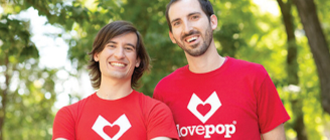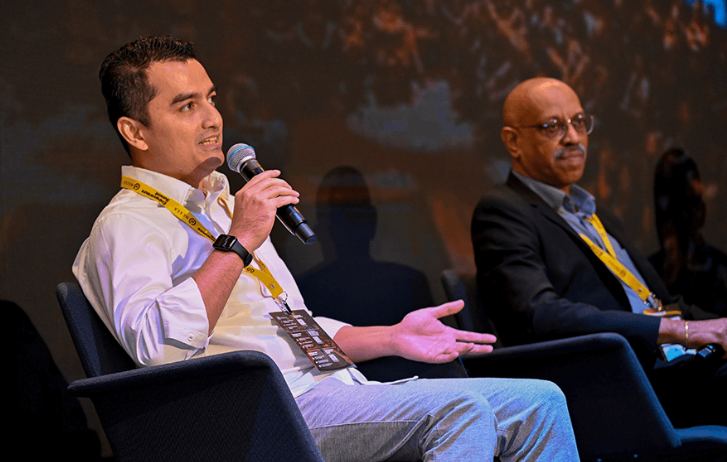
How This Malaysian CEO Built A Tech Empire From Scratch
By FedEx | December 19, 2023
Our Confessions of a CEO column quizzes Asia Pacific leaders on business insights aspiring entrepreneurs can learn from. Johary Mustapha from Forest Interactive reflects on his track record in the fast-growing mobile telecoms industry.
Every entrepreneur’s journey is different. Some spend years trialing different ideas before hitting on a start-up that makes it. Others get a lucky break or hit on something very quickly, spotting a gap in the market no one else has seen.
We spoke to Johary Mustapha, a Malaysian-born techpreneur who embarked on his entrepreneurship journey in 2006 aged 28 when he founded Forest Interactive – an award-winning telecommunications platform provider operating in over 30 countries from 9 locations worldwide.
Since then, he has established Forest Interactive Foundation, which aims to nurture and develop future tech innovators through sustainable programs.
We asked Johary to share the most important lessons he’s learned in almost two decades of operating businesses, and how other SMEs across the region can develop a growth mindset to reach their potential when first starting out.
Johary, can you tell us how your company has evolved from inception to current global footprint?
Johary: Forest Interactive started as a two-person team, with a focus on providing platform-as-a-service mobile content distribution. From our HQ in Malaysia, we have grown the business each year. We now have 93 mobile network operators across 36 countries in Asia and the Middle East.
It’s evolved into a vast international network with an ever-growing client base. Right now, we’re connecting enterprises and content partners to more than 1.9 billion mobile subscribers worldwide. It’s been a mile-a-minute journey – and I’ve learned a lot!
What made you feel ready to launch a business at 28? What did you do to build confidence at that young age?
When I launched Forest Interactive at 28, there was no grand plan or meticulous groundwork laid. I recognized a problem and felt a deep drive to solve it. I seized the opportunity, and assembled the right elements—experience, mentorship, and a passionate team—to turn a solution into a successful business. The rest, as people say, became history.
As a technophile with a focus on back-end solutions, my primary goal was to see if I could address that challenge. The decision to launch a business naturally followed.
When I launched Forest Interactive at 28, I simply recognized a problem and felt a deep drive to solve it.
Despite not planning for entrepreneurship, I was already equipped with a foundation of industry experience. This, combined with a strong support network, played a crucial role in giving me the confidence needed to embark on this journey. Recognizing the importance of mentorship, I sought guidance from experienced individuals who could provide insights and wisdom.
Building confidence also involved assembling a dedicated team that shared my vision and passion for success. Together, we approached the challenge with determination, leveraging our collective skills to overcome obstacles and drive the business forward.
How did you ensure you’re primed for large-scale success, instead of remaining a small operation?
Interestingly, the journey to large-scale success evolved organically as the products and services gained traction.
When I launched Forest Interactive, my approach was to focus on the product and its potential in that moment. Entrepreneurs like myself often start with a simple drive to make their products work. It's through a process of trial and error, learning from mistakes and refining strategies, that a clear path to scalability emerges.
Entrepreneurs like myself often start with a simple drive to make their products work.
In the beginning, my focus was on building a solid foundation. This involved substantial investments in robust infrastructure, assembling a team that combined talent and diversity, and establishing strategic partnerships. These foundational elements were crucial in setting the stage for long-term success and growth.
What are some key strategies you’ve adopted for growth?
Key strategies for Forest Interactive's growth include continuous innovation, strategic partnerships, and global market expansion. By staying ahead of industry trends, collaborating with key players, and tapping into diverse markets, we aim to solidify our position as a leader in the industry.
What is your philosophy on work, life and success?
I believe the philosophy surrounding work, life, and success is deeply personal. It revolves around the individual's motivation and what drives them in life.
For me, it's about the learning experience, deriving fulfillment from what I'm passionate about. Life is a journey, and work is a significant part of that journey. The key is having the option to enjoy it, to find meaning and purpose in what you do.
It's not just about reaching a destination. It's about the path you take to get there and the choices made along the way. Success, in my view, is a natural byproduct of fulfilling this philosophy. When you are engaged in meaningful work, driven by passion, and actively shaping your journey, success becomes a part of the narrative.
Where and how do you get your best business ideas?
Engaging with younger generations is crucial. They provide insights into the aspirations and preferences of the future demographic. Building a business model that is sustainable and resonates with the values of the generations to come is essential for long-term success.
I also draw inspiration from staying closely attuned to industry trends. Keeping a finger on the pulse of emerging technologies, changing consumer behaviors, and global developments helps me stay proactive when it comes to innovation.
Customer feedback is another valuable source. Actively listening to the needs and opinions of our customers provides real-world perspective vital for refining and tailoring our products or services.
What is one belief you hold that other business leaders might disagree with you on?
The idea that a strong focus on employee well-being and satisfaction is not just a moral duty, but a strategic imperative.
I believe that by prioritizing the happiness and growth of our team members, we create a more productive and innovative work environment, ultimately leading to greater business success.
What is the greatest business failure that you learned from the most?
As a CEO, the realization that when a product or service falters, people are quick to pass judgment. They may even abandon ship.
However, I've come to value instances like that as they have taught me key lessons in resilience and adaptability. Instead of accepting defeat, I’ve learned the importance of persevering; tweaking or adjusting our offerings to meet demand.
You need patience in the face of failure. It's easy to abandon a struggling project, but true success requires persistence and a belief in the potential for improvement. Embracing failure as a temporary setback rather than a definitive defeat has been a cornerstone of my leadership philosophy.
Failure also taught me the art of calculated risk-taking.
Failure also taught me the art of calculated risk-taking. By viewing setbacks as opportunities for growth and improvement, we’ve been able to turn adversity into advantage. Our products aren’t always perfect from the start, but with the right adjustments and a determined team, we can align them for success. Without failure, you can’t truly appreciate the joy of success.
What is the most valuable skill you’ve learned in your career, and how does it serve you now?
Adaptability. The business landscape is dynamic, and the ability to change, learn from experiences, and lead through uncertainty is crucial. This skill continues to serve me well in navigating the ever-evolving challenges of the business world.
***
Not only an entrepreneur, Johary also sits on various industry boards in advisory roles. He served as a mentor and judging committee member in Malaysia Digital Economy Corporation (MDEC) Grant programs to deserving tech companies.
Johary is also an angel investor who has invested in Asia-based tech startups, proving that there are many ways, direct and indirect, to make an impact in business.
To discover more start-up stories and learn about CEO journeys like Johary’s, stay tuned for our next Confessions Of A CEO column. For more inspiration, SME stories and tips, visit our Small Business Center here.
SHARE THIS STORY
- How To Ship A Giant Panda
- How To Make Freight Shipments Work For Your Small Business
- The Rise Of Intra-Asia Trade: Opportunities In The China-Southeast Asia Corridor
- Southeast Asia: The Next Manufacturing Powerhouse?
- 8 Most Unusual Shipments In The History Of FedEx
- Where Do Old Planes Go When They Retire?
Sign up now and save on your shipping rates!
Sign up now and earn discounts by shipping instantly with FedEx Ship ManagerTM at fedex.com.
Recommended For You

E-Tailers: Your Customers Are Shopping More Sustainably
For small businesses, easy-to-implement sustainability wins can have a huge impact on consumer perception and spending.
Read More
How To Turn Sustainable Ideas Into Impactful Products
Antoinette started SuperBee as a sustainable solution to combat plastic pollution. Rooted in local communities, her brand is creating worldwide buzz.
Read More
Meet The Shark Tank SME Who Invented Slicegami
Spreading love all over the world through 3D art cards: discover how Lovepop, a company previously featured on Shark Tank, soared to new heights.
Read More


